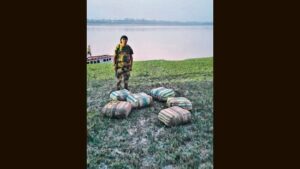Officials on alert for a seasonal smuggling uptick of shellfish eggs
Shellfish eggs from India, especially the southern state of Andhra Pradesh, are in high demand in Bangladesh
It is that time of the year when Border Security Force (BSF) personnel across the riverine border of India with Bangladesh are on particularly high alert. As the sun sets in the eastern part of the country, the border guards keep an eye on the waters to look for any suspicious movement of people trying to smuggle makeshift oxygen bags with shellfish eggs inside to Bangladesh.

Bags of smuggled shellfish
Shellfish eggs from India, especially the southern state of Andhra Pradesh, are in high demand in Bangladesh. At this time of the year, these are among the most smuggled items. On the night of April 21, a BSF patrol team at the Boltala outpost in West Bengal’s North Parganas district recovered 15 such oxygen bags filled with shellfish eggs that smugglers left behind before fleeing upon spotting border guards.
The bags are plastic ones filled with oxygen and water that are recommended for the transport of eggs. Taking advantage of the dark, the smugglers hide from the border guards, reach the border, and then throw the bags into the river. These are then collected by the receivers across the border.
Some also drop the consignment to the bottom of the riverbed, or pass it through the porous India-Bangladesh border.
On April 19, at the same border outpost, BSF seized 21 bags . At two different border outposts of Ghojadanga and CS Khali on the same night, officials seized 20 bags. Records of seizures show that during each attempt, smugglers try to transport around 15-40 bags.
Shellfish eggs, not included in permissible export items under the trade agreement between India and Bangladesh, are in high demand in the grey market. The live eggs that are transported and used for aquaculture in Bangladesh, according to information obtained by border officials from smugglers.
“Shellfish egg is not a prohibited item in India. It only becomes illegal when smugglers try to take it out of India. The fish eggs from Andhra Pradesh and Tamil Nadu (aquaculture is big in both ) are brought on flights to West Bengal and then to the border districts of West Bengal. The smugglers take the help of local villagers, who are legally into prawn farming. They bring the shellfish eggs and keep them alive at the fish farm in the border villages, after which they have a time window of around 6-7 hours (which is how long the oxygen filled in the bag lasts) to smuggle out of Indian borders. If it is not done within that window, the eggs become useless to the smugglers across the border,” an official aware of the details explained.
BSF officials said the eggs are mainly of Bagda Chingri (medium-sized prawns), Galla Chingri (tiger prawns), Chati Chingri (shrimp), and lobster.
“In India, one shellfish egg costs around 60 paise. Each bag or spin ball can hold around 15,000-25,000 eggs. The price of one egg bag in India may be around ₹9,000 but as soon as it reaches Bangladesh it increases nearly 7-8 times. While the egg is a delicacy, it is primarily smuggled for farming there. Maybe they are not able to fill the demand-supply gap there, so smugglers are desperate to get it from India,” said a BSF official who asked not to be named.
According to data seen by HT, the force recovered 1,743 bags in 2021 and 2,024 in 2022. This year, until April 22, 144 were seized, but the activity picks up now.
Amresh Arya, deputy inspector general (DIG) of the BSF’s South Bengal frontier, said, “At this time of the year, our troops are on high alert to stop every attempt of smuggling of shellfish eggs. Ahead of the monsoon, the smugglers try to smuggle eggs so that they can be farmed just in time. All smuggling routes in the areas of the South Bengal frontier are under strict vigil. BSF will not allow any kind of smuggling or transborder crime on the border under any circumstances.”
source-https://www.hindustantimes.com/india-news


